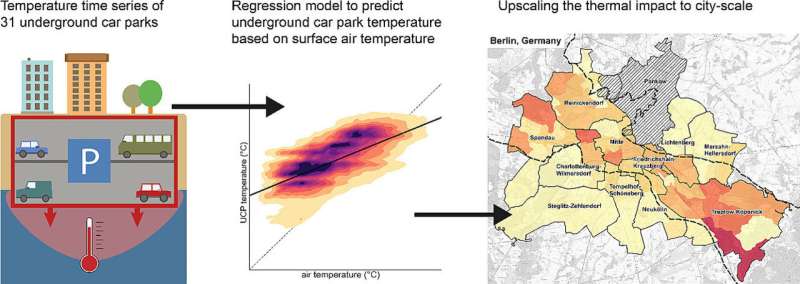This article has been reviewed according to Science X's editorial process and policies. Editors have highlighted the following attributes while ensuring the content's credibility:
fact-checked
peer-reviewed publication
trusted source
proofread
Study shows underground car parks heat up groundwater and proposes a geothermal energy solution

The heat given off by car engines warms up underground car parks in such a way that the heat passes through the ground into the groundwater. In Berlin alone, enough energy is transferred to the groundwater to supply 14,660 households with heat. This finding was made by a team from Martin Luther University Halle-Wittenberg (MLU), the Karlsruhe Institute of Technology, and the University of Basel.
According to the researchers, this warming could have long-term effects on groundwater quality. In their study, published in the journal Science of The Total Environment, they also propose a solution. Using geothermal energy and heat pumps, the heat could be extracted from the ground and utilized.
The researchers examined temperatures in 31 underground car parks in various cities throughout Germany, Austria and Switzerland. In six of them, they were also able to measure the temperature of the groundwater in the immediate vicinity. This allowed a heat profile to be created for all locations. Their investigations showed that underground car parks heat up the groundwater throughout the year.
The volume of traffic in the underground car parks, their proximity to the groundwater and ambient groundwater temperatures were the biggest influencing factors. "Public underground car parks heat up the groundwater more than private facilities as they are often deeper and the cars park there for shorter periods of time," explains Maximilian Noethen, a geoscientist from MLU.
According to the team, geothermal energy and heat pumps could help utilize the excess heat in the ground. "This would have the advantage of extracting energy from the groundwater and thus cooling it down," says Noethen. Based on modeling for 5,040 underground car parks in Berlin, the team calculated groundwater warming from the underground car parks for the city. Since many underground car parks in the central districts of the capital are located in or near groundwater, a particularly large amount of heat is transferred to the groundwater there.
According to their calculations, about 0.65 petajoules of energy are emitted annually in Berlin. This could theoretically supply around 14,660 households with heat. "Of course, heat from groundwater alone is not enough to cover the heating needs of a city like Berlin or even a country like Germany. Nor are the temperature levels of the groundwater near the surface high enough to provide heat without a heat pump.
"However, we do know from previous studies that the potential for geothermal energy goes well beyond this and that it could make a significant contribution to supplying sustainable heat," says Professor Peter Bayer from the Institute of Geosciences and Geography at MLU.
Groundwater temperatures have been rising for decades as a result of global warming. In cities, this is exacerbated by dense urban development, soil sealing, lack of vegetation and heat radiating directly from tunnels and underground car parks. Since the organisms in the groundwater are adapted to constant temperatures, species composition could also change.
"This could affect the quality of the groundwater from which we draw large parts of our drinking water. This development needs to be controlled through a variety of measures," concludes Bayer.
More information: Maximilian Noethen et al, Thermal impact of underground car parks on urban groundwater, Science of The Total Environment (2023). DOI: 10.1016/j.scitotenv.2023.166572


















